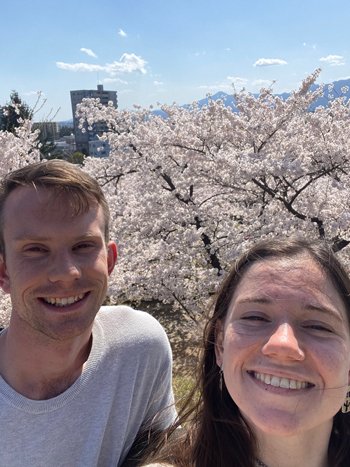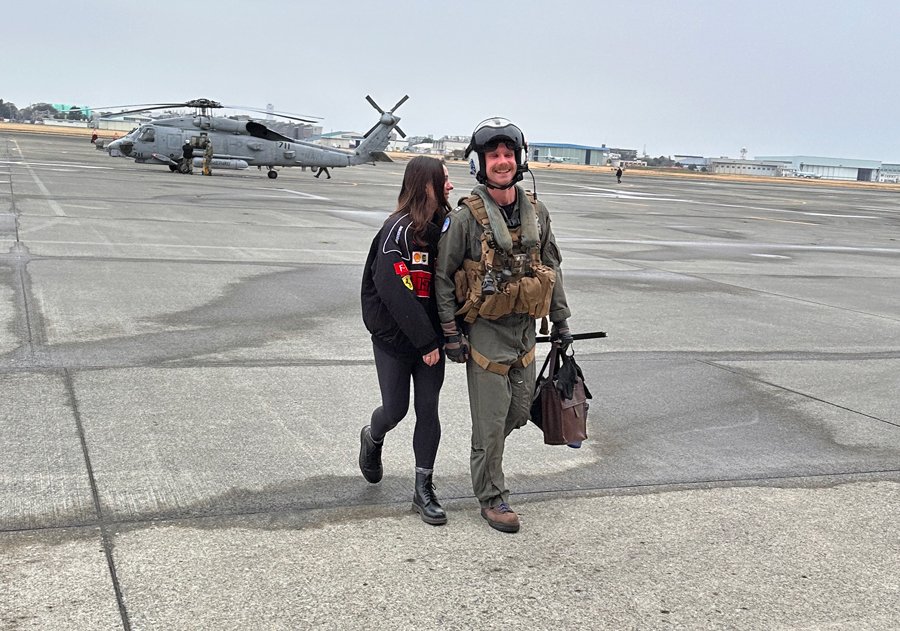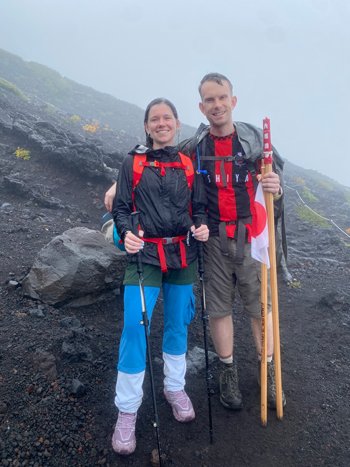How a New Navy Spouse Found ‘Community Beyond Base’ to Transform Her Life in Japan
The first thing I learned about Japan was that the summers are hot. Extremely hot and extremely humid. I learned this in August 2022 the hard way—pushing an overweight suitcase and backpack up steep hills, navigating from the vague directions on my phone. The second thing I learned is that Japan isn’t big on street signs.
The third thing? It’s the perfect place to be thrown into the deep end when you are brand-new to being a military spouse.
When my boyfriend (now husband) had moved to Japan for his first tour with the Navy in February 2022 and deployed from there shortly after, I genuinely didn’t know the next time I would see him. Japan had restricted international travel during the COVID pandemic. By the summer the travel restrictions had eased slightly and with a little lucky timing, I was one of the few foreigners able to make the trip.
Just a few hours after my flight landed, I received a call: Andrew’s ship was delayed, and I would need to spend the next 10 days alone. Suddenly I found myself trying to find my soon-to-be home on a 100-degree day with only my phone as a guide.
Almost three years later, as we prepare to leave Japan I am devastated to be going. We are leaving behind a country that has come to feel like home and a sense of community both on and off base that made the curveballs that this assignment has thrown at us—language barriers, deployment schedules, a year of working night shifts—enlightening, self-affirming, and even fun.

Longwell and her husband, Lt. Andrew Smith, on a trip to Morioka, Japan, during cherry blossom season. (Photo courtesy of the author)
It felt like my life had been upended when I returned permanently in the spring of 2023 as a new Navy spouse: buying groceries on base required an ID; going to the doctor required my husband to come with me; and outside of Andrew’s coworkers, there was no one I could communicate with in English. On top of everything, I was determined to keep my U.S.-based job, which meant working from 10 p.m. to six a.m. Japan time to stick to East Coast hours.
There are hundreds if not thousands of articles online about navigating life as a military spouse. There are resources and recommendations about your career, communities you can join, your kids, your housing situation, your partner’s job. Looking at the resources around me, suddenly it felt like everything in my life, even my remote night shift and sleep schedule, were adapted for the Navy.
Being stationed abroad can exacerbate all of this, as your only options for housing, medical care, or socializing are somehow affiliated with the nearest base. While all of these were crucial resources for getting established, I quickly realized how claustrophobic it could feel. It was hard to justify staying at home when Tokyo was only a 45-minute train ride away.
Faced with a lot more alone time during deployments, I started taking community Japanese classes. Even starting with the very basics, having an understanding of the language was transforming my life in Japan. In our neighborhood and around base, Japanese businesses went out of their way to be accessible and use English when they could; being able to return the favor just a little started to make once-alienating interactions less lonely.
I expected my class to be entirely American since we were so close to a base, but I was surprised by how wrong I was. Just a few minutes from the main gates, in our relatively small suburb, the class was made up of people from around the world, who were all navigating the same challenges—being far from their families, overcoming a language barrier, and learning how to appropriately react to Japan’s frequent earthquakes.
Venturing farther into Tokyo, I was able to find an even larger community. Things that felt like afterthoughts in the U.S., such as taking a yoga class or attending a photography exhibition, led me to a community of English speakers from all over the world. We shared the experiences I struggled to articulate to friends back home, like embarrassing language mistakes (ordering three coffees for two people and forcing ourselves to take several large sips to make it look like, yes, we meant to do that). We commiserated over the most efficient way to kill giant spiders when they appear in your house marking the start of summer (I find the detachable shower hose works well, but going in head-to-toe ski gear is said to be a safe bet too) and made notes about nearly every English language bookstore in Tokyo (the consensus is Books Kinokunya in Shinjuku has the best selection).

Longwell and Smith at Naval Air Facility Atsugi shortly after his arrival home from deployment. (Photo by Peggy Kerber)
Each time a deployment approached, the weeks leading up felt like a cruel countdown, but my community beyond base lessened that burden. Watching my husband and the other members of his squadron, our friends, pack up their lives and say goodbye to their families used to feel like my whole world was disappearing. But by the third deployment, those weeks felt less like a cliff, because I was able to find company in the people around me. While I might have been the only one in my yoga studio on a particular afternoon whose partner was simply “somewhere in the ocean,” I was not the only one who has had to skip important holidays and call family from the other side of the world, or alone in navigating the weird balance of prioritizing your own career versus your partner’s more demanding one.
Award-Winning Journalism in Your Inbox
During Andrew’s deployments, friends back home asked for countdowns in disbelief, reminding me exactly how many weeks it had been, and how many more months it would be. But I found myself taking more advantage of Japan’s incredible design of dine-alone restaurants. Finding other foreigners around Tokyo, it felt like the world could keep spinning.
I discovered the privilege of living in Japan was being able to find the quiet seasons. Watching the leaves change in the fall is just as stunning as seeing the cherry blossoms each March, and finding a favorite cafe, tucked into the trees across from a quiet shrine, can make it feel, even for just an afternoon, like you are on an adventure.

Longwell and Smith on a hike at Mt. Fuji. (Photo courtesy of the author)
When I first arrived in 2022, just navigating to my own house from the train had me in tears. Less than two years later I drove myself across the country to explore Mashiko, a pottery town that had been recommended to me by a friend.
There, I stayed at a small hotel run by an elderly woman. In the morning, in broken Japanese over NHK’s coverage of Shohei Ohtani and the Dodgers beating the Yankees in the World Series, the other guest and I chatted with the owner. She dismissed our concerns over the 3.0 magnitude earthquake that had happened the night before (they happen every night, even if they’re just a 1.0) and compared notes on driving through the Japanese countryside alone. In these moments, I often find myself thinking, I never could have imagined this moment or that I would know what to do.
It was because of the people around me, their recommendations, their own past experiences, and knowing that someone else had done this before and lived to tell the tale that I was able to get so much out of my time in Japan.
As we start to prepare to pack our things and move back to the U.S., I am grateful that this move is bittersweet. An assignment that I had worried might mark the end of my new relationship has turned out to be the most formative chapter of my life.
Our Journalism Depends on Your Support
While I am sad to be leaving a place that has come to feel like home, it is reassuring to know that somewhere along the way, someone else has done this before, and even in an experience that can be incredibly isolating, there is probably someone closer than you think who knows what it is like.
Worst-case scenario, just point at the TV, wave your hands, and declare that you too are rooting for Ohtani.
This War Horse reflection essay was written by Maddy Longwell, edited by Mike Frankel, fact-checked by Jess Rohan, and copy-edited by Mitchell Hansen-Dewar. Hrisanthi Pickett wrote the headlines.





Comments are closed.